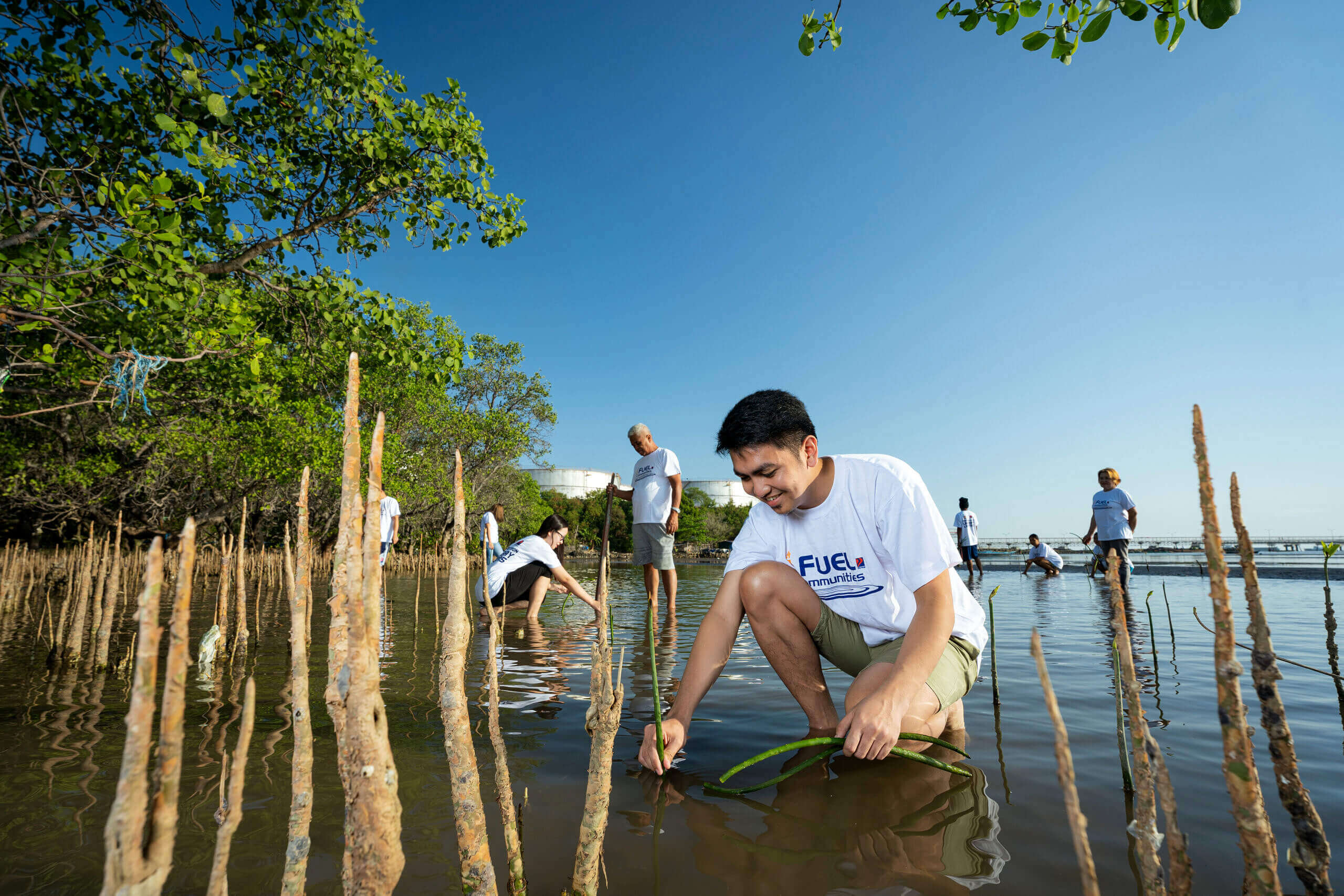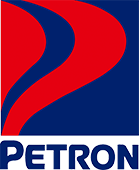
For almost 90 years, Petron has operated its business with due consideration for the environment. Our mission of “caring for the community and the environment” and our corporate commitment to health, safety, and environmental policies aim to protect and preserve the natural environment and promote the health, safety, and security of all stakeholders throughout our value chain. We go beyond merely complying with existing regulations and actively seek ways to initiate, improve, and innovate our business practices to nurture nature.
TERMINAL ECOWATCH PROGRAM. Petron developed the Terminal EcoWatch that is unique in the industry. This program builds on the Industrial EcoWatch Rating System (IERS), an initiative under Department of Environment and Natural Resources (DENR) Administrative Order 2003-26, which encourages self-regulation among industries to improve environmental compliance and performance through a rating system. While the IERS mainly focuses on improving air and water quality, our EcoWatch Program goes further by assessing the environmental performance of our Terminal Operations.
Specifically, it evaluates the maturity of our management programs in several areas, including Wastewater Quality, Air Quality, Solid Waste, Toxic and Hazardous Waste, as well as Environmental Impact Assessment and Environmental Management System. The goal is to promote self-monitoring and compliance with environmental standards among our operating facilities, while also encouraging pollution reduction beyond compliance and enhancing efficiency and bottom-line performance. Furthermore, the program aims to develop the capability of our terminals to self-regulate through environmental management systems.
Since the start of 2014, our Terminal Ecowatch Program has been fully implemented in all of our terminals across the Philippines. This program is an important step in improving our environmental performance and demonstrating our commitment to sustainable practices. It allows us to identify areas where we can improve our environmental performance and strengthen our environmental management systems, ultimately helping us achieve our goal of sustainable operations.
A team of highly qualified personnel, composed of members from Corporate Technical Services Group (CTSG)-Environment, Operations HSSE, and the Petron Environment Council, conducts an annual audit of every Terminal to evaluate its environmental performance. The team assesses the Terminal’s performance based on several broad parameters.
Firstly, the team evaluates a Terminal’s level of compliance with various environmental laws and regulations and their respective implementing rules and regulations. Specifically, the following environmental laws are taken into consideration: 1) Presidential Decree (P.D.) No. 1586 that established the Philippine Environmental Impact Statement [EIS] System; 2) Republic Act (R.A.) No. 6969 or the “Toxic Substances and Hazardous and Nuclear Wastes Control Act of 1990”; 3) R.A. No. 8749 or the “Philippine Clean Air Act of 1999”; 4) R.A. No. 9003 or the “Ecological Solid Wastes Management Act of 2000”; and 5) R.A. No. 9275 or the “Philippine Clean Water Act of 2004”.

Secondly, the assessment team evaluates the extent of the Terminal’s management effort to reduce and control pollution, and to implement environmental management plans and programs. Finally, the team evaluates the consistency and continual improvement through the years of implementation.
To ensure the rating criteria remain relevant and attuned to the latest environmental laws and regulations implemented by DENR and other allied regulatory agencies, and on the requirements of our stakeholders, including from investors and financial institutions, the assessment team updates its rating criteria annually.
To evaluate performance, our terminals are rated using a color-coding system, with Platinum being the highest rating at 6.00, followed by Gold, Silver, Green, and Blue. Terminals that fail to perform adequately are marked Red for insufficient compliance and Black for non-compliance. A Platinum Plus rating is awarded to terminals that sustain their Platinum rating for three consecutive years and are elevated to the Hall of Fame.
Since the inception of the program, our Terminals have steadily improved in their ratings, from an average rating of 2.98 in 2014 to an average of 5.64 in 2022, or an 89% increase in collective score. At the end of 2022, all 30 of our terminals and sales offices received high ratings, with the Davao Terminal earning a Platinum Plus rating for four consecutive years, and ten terminals achieving Platinum rating, while the remaining received gold or silver ratings.
Through the Terminal EcoWatch Program, we are able to further support Petron’s sustainability efforts by promoting self-monitoring and compliance with environmental standards among our terminals, encouraging pollution reduction beyond compliance, and enhancing the capability of our facilities to self-regulate through environmental management systems. Additionally, this supports our commitment to greening initiatives such as mangrove reforestation, which contributes to our carbon sequestration efforts.

POLLUTION CONTROL OFFICERS (PCO) TRAINING. To further encourage sustainable practices across our supply chain, we established a PCO Training program in 2010 as an essential learning tool for Petron employees, service station dealers, and other stakeholders. This is recognized by the DENR Central Office and fulfills the 40-hour environmental training requirement for accreditation as a pollution control officer by the Environmental Management Bureau.
The PCO Training course promotes awareness of environmental laws and regulations, both locally and globally, and highlights the most pressing environmental issues of our time. By completing this course, participants gain a better understanding of their role in promoting environmental compliance and best “green” practices in their communities. Moreover, the PCO’s responsibility is to monitor and report on environmental performance and ensure compliance with environmental regulations. Thus, we empower our stakeholders to take on this role and enhance their capabilities to drive sustainable practices within their operations.
Since its inception, the PCO Training program has successfully trained and graduated 3,627 individuals. Moreover, the Corporate Technical Services Group-Environment has been recognized as a Training Organization for Category A Pollution Control Officers, with a valid certification until December 15, 2023. This allows us to continue providing the 40-hour PCO training and 8-hour Managing Head training to our service station dealers and qualified terminals for PCO accreditation.
To further motivate our PCOs, we have implemented a recognition program that acknowledges their crucial role in executing Petron’s pollution prevention initiatives, resource efficiency, compliance with legal requirements, and social development. The recognition program comprises the Outstanding Pollution Control Officer award and the Environmental Initiative Award, both of which are presented during the National Environment Month Celebration in June.
The Environment Council of Petron reviews all nominations for the Outstanding Pollution Control Officer award and evaluates all applications for the Environmental Initiative Award. The nominees are evaluated based on the following criteria:
- All accredited Pollution Control Officers of Petron’s facilities; and
- Innovativeness and impact of environmental programs implemented.
Petron Environment Summit
The Petron Environment Summit was initially organized by CTSG-Environment as a virtual forum for the company’s Management Committee, Managing Heads, Pollution Control Officers, and select participants within the San Miguel Group. Its purpose was to foster a shared understanding of the latest environmental issues that impact our business continuity and sustainability, as well as the best ways to address them. The session was quickly elevated to become an environment summit, with the goal of expanding its reach and elevating the learnings among the company’s key officers and personnel. It was also an excellent opportunity to showcase the best practices on environmental management implemented in various Petron facilities and benchmark with colleagues from SMC.

This was made more relevant by being scheduled in November, to coincide with National Environmental Awareness Month, National Climate Change Consciousness Week, Clean Air Month, and National Day for Youth in Climate Action. The forum covered topics such as the latest regulatory environment, climate change, and disaster risk reduction, and featured a distinguished lineup of resource speakers from government agencies such as the Department of Science and Technology (DOST) and DENR-EMB, as well as industry experts from both within and outside of SMC organization.
The second installment of Petron’s Environment Forum in 2022 was focused on sustainability and ESG and featured critical inputs from the University of Asia & the Pacific-Center for Social Responsibility (UA&P-CSR) and SMC’s Corporate Sustainability Office. A highlight of the forum was the presentation of SMC’s ESG Roadmap, which will guide the different business units of SMC, including Petron, in formulating their respective long-term frameworks and aligning them into a cohesive pathway towards long-term success.

Petron has always been committed to caring for the environment and communities, which is why the sustainability summit is an important milestone in our journey. Since our incorporation in 1933, we have made it a priority to measure, manage, and minimize our environmental footprint at every stage of our operations.
However, we acknowledge that achieving our ESG goals requires much more; we need to be equipped with the knowledge and tools necessary to succeed. That is why we are continuously learning, improving, and innovating by seeking the expertise of external partners and collaborating internally to identify the best practices for our company. We understand that our ESG efforts don’t just benefit our company, but also our stakeholders. The Terminal EcoWatch, PCO Training, and Sustainability Summit allow us to share our progress, learn from our peers, and chart a path forward to a more sustainable future for our company, our communities, and our country.
